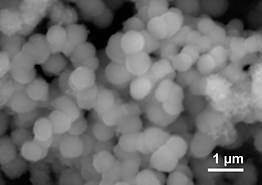
Plant Silicification: The effect of silicon on plants
Silica (SiO2) is an extremely tough material that is incorporated into the cell wall. Silicon, absorbed by roots as silicic acid - Si(OH)4, increases the resistance of plants to biotic and abiotic stresses. Silica is deposited mainly in the root endodermis and in the shoot epidermis under the cuticle, in specific silica cells at the epidermis, and in the cell wall of transpiring organs.
We discovered the first and only known protein to precipitate silica in plants, and explained the formation of silica cells in sorghum leaves (Kumar, Elbaum et al. 2017,2018,2020,2021).
The molecular knowledge on silica deposiiton in plants allows us to utilize it in vitro.
We now know that Siliplant1 catalyzes the condensation of silicic acid into silica and stabilizes the surfaces of the silica nano particles (Ayieko et al., 2023).
Silica particles prepared with a peptide repeating 5 times in Siliplant1
Lignin local depositions initiate silica aggregation in the roots of sorghum through the activity of hydrogen peroxide (Zexer and Elbaum 2020,2022).
A current challenge in the field is to link the physiological and anatomical observation to molecular mechanisms that will explain the way in which silicification increases tolerance of plants to stresses.


Rivka
Elbaum's
Lab
The RH Smith Institute for Plant Sciences and Genetics in Agriculture, The Faculty of Agriculture, Rehovot 7610001
Israel
Room 2118 bldg. A
Email: rivka.elbaum@mail.huji.ac.il Phone: +972(0)8-948-9335
Fax: +972(0)8-948-9889